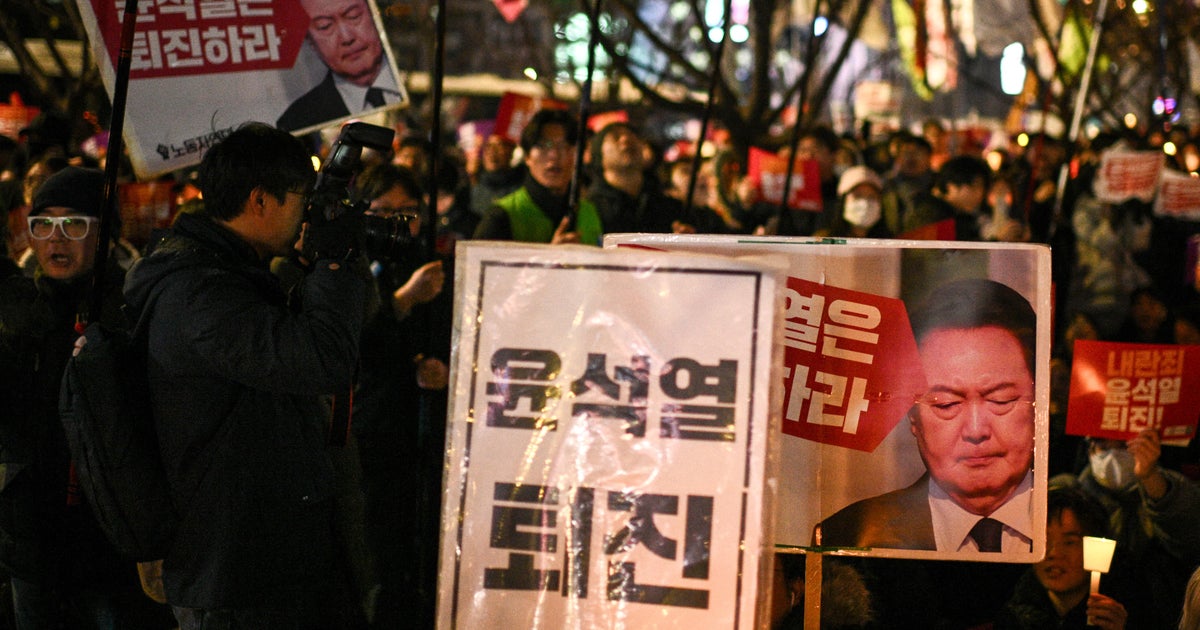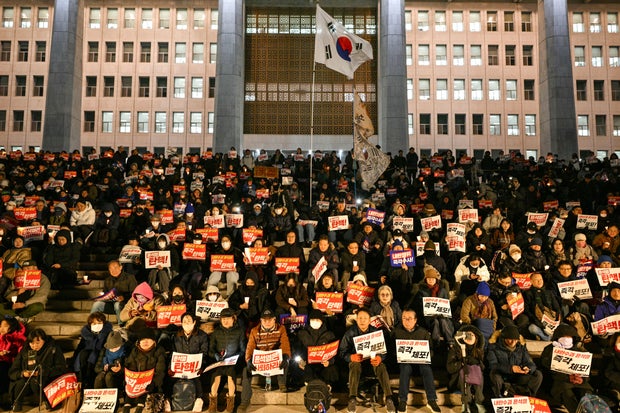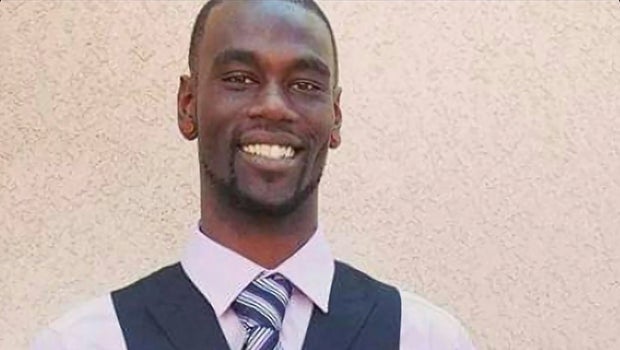CBS News
South Korea martial law lifted, but democracy tarnished as President Yoon Suk Yeol faces likely impeachment

Seoul — South Korean President Yoon Suk Yeol seemed to treat a declaration of martial law as if it were a light switch, flipping it on at 11 p.m. Tuesday night, only to be unanimously rebuked in an emergency session of the country’s parliament just two hours later. It took him about three hours from that point to accept defeat and announce that he was lifting the martial law order.
The martial law declaration and revocation within six hours was the fiercest whiplash between military control and democracy that South Korea has endured since it became a democracy in 1987. It appears highly likely to bring a swift end to Yoon’s two-year tenure as the country’s elected leader.
The president’s gamble seemed rooted primarily in his own domestic political isolation and, while short-lived, it was sure to have major ramifications both for Yoon as a politician, and for South Korea as a nation.
ANTHONY WALLACE/AFP/Getty
Below is a look at what Yoon did, why he did it, and what it could mean for one of Asia’s most vibrant democracies and biggest economies.
What is martial law?
A declaration of martial law is typically used by political or military leaders in a country facing a purported immediate threat to stability or security. It is ostensibly intended to protect the rule of law and citizens by putting military forces in immediate control of a country, suspending the authority of a civilian government and legal system.
Yoon’s order immediately put South Korea’s military in charge of security across the country, froze virtually all existing laws and granted the forces extraordinary powers to detain people without charge and to censor the media.
There was no indication that South Korean troops took advantage of the powers granted to them during the six hours of martial law on Tuesday evening, though there were tense scuffles as forces blocked access to the parliament building and throngs of angry citizens turned up to protest Yoon’s sudden move.
Why did South Korea’s president impose martial law?
“I declared martial law at 11:00 last night with a firm will to save the country against anti-state forces that are trying to paralyze the essential functions of the state and destroy the constitutional order of liberal democracy,” Yoon told his nation in a televised address, claiming the declaration would protect south Korea from a “threat of the North Korean communist forces.”
But he never identified any specific military movements by the North, and his shock move appeared to have been directed more at what he called the “legislative dictatorship” of his own country’s opposition Democratic Party.
Yoon has seen his approval rating fall for several months, and with the opposition in control of the parliament for the last two years, he’s struggled to move forward any of his political objectives. He’s also faced criticism for dismissing multiple calls for independent investigations into financial scandals involving himself and his wife.
He complained Tuesday that the opposition had effectively left him unable to govern, including by proposing nearly two dozen impeachment motions against his conservative government and slashing his national budget by at least $700 billion dollars.
But despite Yoon’s political isolation and falling support among voters, few in the country anticipated a counterattack as dramatic as the declaration of martial law.
What will the martial law declaration mean for South Korea?
“Whichever way this shakes out, this is a major setback for what has been seen as a democratic stronghold in the Asia Pacific for the last 44 years,” said CBS News national security contributor Sam Vinograd, a former senior Homeland Security official.
“The overall perception of South Korea as a stable democracy has been tarnished at a time when an aggressive China and overall retrenchment from democracy globally are big concerns for U.S. national security,” said Vinograd, who’s now the geopolitical lead at the Brunswick Group think tank in Washington.
The White House, in a statement late Tuesday in Washington, expressed relief that Yoon had rescinded his martial law declaration.
“Democracy is at the foundation of the U.S.-ROK alliance, and we will continue to monitor the situation,” an administration spokesperson said, referring to South Korea by the initials of its official name, the Republic of Korea.
Washington has a deeply vested interest in stability in South Korea. About 28,500 U.S. troops are stationed in the country, largely to deter any aggression by nuclear-armed North Korea, but also as a deterrent against an increasingly assertive China.
South Korea’s capital Seoul lies just 30 miles south of the Demilitarized Zone — the no-man’s land created to separate the North and South when an armistice ended combat in the Korean War in 1953. The two countries technically remain at war as there was never a formal treaty, and tension between the Koreas has escalated in recent years, including under Yoon, who’s taken a harder line on the North than his predecessor.
“The Biden administration is going to be faced with some very difficult decisions about what to say and do,” said Vinograd. “South Korea is one of our closest allies, but this move seems to have come as a surprise to the White House.”
“South Korea is a strong balancing factor against North Korea and against communist China,” Vinograd said, adding that both the North and Moscow “are likely cheering the democratic upheaval in South Korea.”
“They see any signs of instability in South Korea as something that they can take advantage of… Without a vibrant democracy in South Korea, forces within China, within North Korea, will likely feel emboldened, and overall, democratic tendencies in the Asia Pacific will likely take a hit as well.”
Yoon faces calls to resign, threat of impeachment
Yoon looked increasingly likely to lose his job Wednesday after his seemingly dramatic miscalculation of political support.
The Democratic Party called quickly for Yoon to step down or face impeachment, and along with five smaller opposition parties, it submitted a bill in parliament Wednesday to impeach the president, with voting expected on the measure Friday or Saturday.
“It was clearly revealed to the entire nation that President Yoon could no longer run the country normally. He should step down,” senior Democratic Party lawmaker Park Chan-dae said in a statement, urging Yoon not to wait to be forced out.
South Korea’s parliament, the National Assembly, can impeach the president if over two-thirds of lawmakers vote in favor of the move. If it happens and he doesn’t resign first, South Korea’s constitutional court will then hold a trial to either confirm or deny the impeachment motion. Six of the nine justices on the court must back an impeachment for it to go ahead.
Yoon’s PPP holds 108 seats in the 300-member legislature, but even his own party appeared unlikely to back the embattled president too robustly. Its leader called Wednesday for the country’s defense minister to be sacked and the entire cabinet to resign, and the unanimous vote overruling his martial law declaration was a clear indication of the level of opposition to his conduct.
South Korean stocks tumble after martial law declaration
The streets of Seoul appeared largely normal Wednesday despite the overnight tumult. While police were out in force amid renewed protests against Yoon around the parliament, the usual morning rush hour traffic choked roads and railways.
More protests were expected, however, and South Korea’s biggest labor union coaltion, the Korean Confederation of Trade Unions, declared a nationwide strike and said it would hold a rally in the capital until Yoon left office.
The U.S. Embassy in Seoul urged American nationals in the city to avoid areas where protests were taking place, and some of the country’s biggest employers, including the LG Electronics brand, urged employees to work from home.
The unrest also took a toll on Asian stocks, with South Korean shares falling about 1.4% Wednesday and the country’s currency, the won, stable but still close to a two-year low against the dollar.
South Korean Finance Minister Choi Sang-mok and national bank governor Rhee Chang-yong gathered their deputies overnight for emergency meetings, and the finance ministry promised to take whatever measures were necessary to prop up falling share prices, according to the Reuters news agency.
Reuters said canned goods and staples such as instant noodles and bottled water flew off store shelves overnight as South Koreans feared a possible lingering political crisis.
“South Korea is no stranger to martial law,” Vinograd told CBS News, noting that the measure had been declared at least 15 times by various authoritarian regimes since the country’s founding in 1948.
“I’m deeply disturbed by this kind of situation,” Seoul resident Kim Byeong-In, 39, told Reuters overnight, “and I’m very concerned about the future of the country.”
contributed to this report.
CBS News
12/4: The Daily Report – CBS News

Watch CBS News
Be the first to know
Get browser notifications for breaking news, live events, and exclusive reporting.
CBS News
2 students wounded in shooting at Northern California school

Watch CBS News
Be the first to know
Get browser notifications for breaking news, live events, and exclusive reporting.
CBS News
Memphis police discriminate against Black people and use excessive force, Justice Department report finds

The Memphis Police Department uses excessive force and discriminates against Black people, according to the findings of a U.S. Department of Justice investigation launched after the beating death of Tyre Nichols after a traffic stop in 2023.
A report released Wednesday marked the conclusion of the investigation that began six months after Nichols was kicked, punched and hit with a police baton as five officers tried to arrest him after he fled a traffic stop.
The report says that “Memphis police officers regularly violate the rights of the people they are sworn to serve.”
“The people of Memphis deserve a police department and city that protects their civil and constitutional rights, garners trust and keeps them safe,” Assistant Attorney General Kristen Clarke of the Justice Department’s Civil Rights Division said in an emailed statement.
Courtesy of the Nichols family via AP
The city said in a letter released earlier Wednesday that it would not agree to negotiate federal oversight of its police department until it could review and challenge results of the investigation.
City officials had no immediate comment on the report but said they plan to hold a news conference Thursday after Justice Department officials hold their own news conference in Memphis on Thursday morning to address the findings.
Police video showed officers pepper spraying Nichols and hitting him with a Taser before he ran away from a traffic stop. Five officers chased down Nichols and kicked, punched and hit him with a police baton just steps from his home as he called out for his mother. The video showed the officers milling about, talking and laughing as Nichols struggled with his injuries.
Nichols died on Jan. 10, 2023, three days after the beating. The five officers — Tadarrius Bean, Demetrius Haley, Emmitt Martin, Desmond Mills Jr. and Justin Smith — were fired, charged in state court with murder, and indicted by a federal grand jury on civil rights and witness tampering charges.
Nichols was Black, as are the former officers. His death led to national protests, raised the volume on calls for police reforms in the U.S., and directed intense scrutiny towards the police department in Memphis, a majority Black city.
The report specifically mentions the Nichols case, and it addresses the police department’s practice of using traffic stops to address violent crime. The police department has encouraged officers in specialized units, task forces, and on patrol to prioritize street enforcement, and officers and community members have described this approach as “saturation,” or flooding neighborhoods with traffic stops, the report said.
“This strategy involves frequent contact with the public and gives wide discretion to officers, which requires close supervision and clear rules to direct officers’ activity,” the report said. “But MPD does not ensure that officers conduct themselves in a lawful manner.”
The report said prosecutors and judges told federal investigators that officers do not understand the constitutional limits on their authority. Officers stop and detain people without adequate justification, and they conduct invasive searches of people and cars, the report said.
“Black people in Memphis disproportionately experience these violations,” the report said. “MPD has never assessed its practices for evidence of discrimination. We found that officers treat Black people more harshly than white people who engage in similar conduct.”
The investigation found that Memphis officers resort to force likely to cause pain or injury “almost immediately in response to low-level, nonviolent offenses, even when people are not aggressive.”
The report says officers pepper sprayed, kicked and fired a Taser at an unarmed man with a mental illness who tried to take a $2 soda from a gas station. By the end of an encounter outside the gas station, at least nine police cars and 12 officers had responded to the incident, for which the man served two days in jail for theft and disorderly conduct.
In a letter to the Justice Department’s Civil Rights Division released earlier Wednesday, Memphis City Attorney Tannera George Gibson said the city had received a request from the DOJ to enter into an agreement that would require it to “negotiate a consent decree aimed at institutional police and emergency services.”
A consent decree is an agreement requiring reforms that are overseen by an independent monitor and are approved by a federal judge. The federal oversight can continue for years, and violations could result in fines paid by the city.
It remains to be seen what will happen to attempts to reach such agreements between cities and the Justice Department once President-elect Donald Trump returns to office and installs new department leadership. The Justice Department under the first Trump administration curtailed the use of consent decrees, and the Republican president-elect is expected to again radically reshape the department’s priorities around civil rights.
“Until the City has had the opportunity to review, analyze, and challenge the specific allegations that support your forthcoming findings report, the City cannot — and will not — agree to work toward or enter into a consent decree that will likely be in place for years to come and will cost the residents of Memphis hundreds of millions of dollars,” the letter said.
The officers in the Nichols case were part of a crime suppression team called the Scorpion Unit, which was disbanded after Nichols’ death. The team targeted drugs, illegal guns and violent offenders, with the goal of amassing arrest numbers, while sometimes using force against unarmed people.
Memphis police never adopted policies and procedures to direct the unit, despite alarms that it was minimally supervised, according to the Justice Department report. Some prosecutors told department investigators that there were some “outrageous” inconsistences between body camera footage and arrest reports, and if the cases went to trial, they would be “laughed out of court.” The report found that the unit’s misconduct led to dozens of criminal cases being dismissed.
In court proceedings dealing with Nichols’ death, Martin and Mills pleaded guilty to the federal charges under deals with prosecutors. The other three officers were convicted in early October of witness tampering related to the cover-up of the beating. Bean and Smith were acquitted of civil rights charges of using excessive force and being indifferent to Nichols’ serious injuries.
Haley was acquitted of violating Nichols’ civil rights causing death, but he was convicted of two lesser charges of violating his civil rights causing bodily injury. The five men face sentencing by a federal judge in the coming months.
Martin and Mills also are expected to change their not guilty pleas in state court, according to lawyers involved in the case. Bean, Haley and Smith have also pleaded not guilty to state charges of second-degree murder. A trial in the state case has been set for April 28.
Justice Department investigators have targeted other cities with similar probes in recent years, including Minneapolis after the killing of George Floyd, and Louisville, Kentucky, following an investigation prompted by the fatal police shooting of Breonna Taylor.
In its letter, the city of Memphis said the DOJ’s investigation “only took 17 months to complete, compared to an average of 2-3 years in almost every other instance, implying a rush to judgment.”











